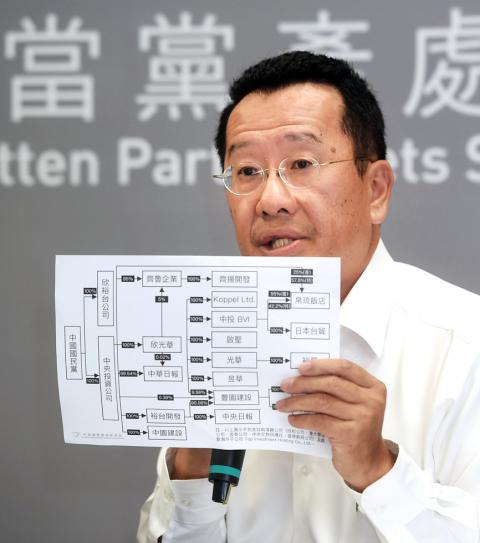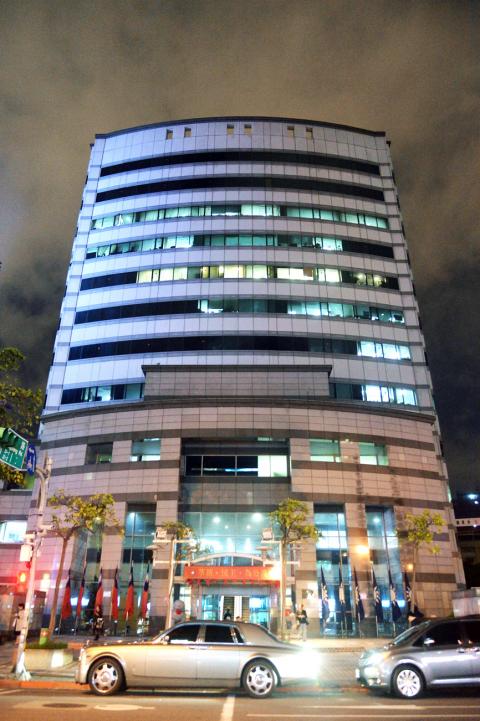The Chinese Nationalist Party (KMT) must transfer all its rights to shares issued by Central Investment Co (中央投資公司) and Hsinyutai Co (欣裕台) to the government, the Ill-gotten Party Assets Settlement Committee said yesterday, after concluding that the two companies were founded using illegally obtained assets.
Committee Chairman Wellington Koo (顧立雄) said the committee would send the KMT a letter of disposition no later than Tuesday and give it 30 days to comply with the assets transfer.
The “rent” the KMT pays for its headquarters on Taipei’s Bade Road, Sec 2 — registered under Central Investment and Hsinkuanghua Co (欣光華股份有限公司) — must be paid to the government after the transfer of shareholding rights, Koo told a news conference after the committee meeting.

Photo: Fang Pin-chao, Taipei Times
Central Investment is a wholly owned holding company of the KMT, while Hsinkuanghua is a fully owned subsidiary of Central Investment, the committee’s investigation found.
The KMT in late July signed a five-year contract with Central Investment and Hsinkuanghua to lease the building and paid the rent — totaling about NT$320 million (US$10 million) — in advance, despite not having allocated any funds for the rent this year, Koo said, adding that the KMT probably secured the lease out of fear of having its ill-gotten assets seized.
Citing the committee’s investigation, Koo rebutted KMT Administration and Management Committee director Chiu Da-chan’s (邱大展) claims on Thursday that Central Investment’s and Hsinyutai’s capital came from legitimate sources.

Photo: CNA
“In an era when there was no distinction between the party and the state, half of the KMT’s revenue came from state subsidies, while its affiliated organizations provided about 20 percent, and it had some other sources of income,” Koo said.
The KMT’s legitimate assets and income from the so-called “special surcharges” it levied on businesses to increase the national defense budget made up a tiny portion of its revenue, he said.
However, with the exception of 1959 and 1961, in which the then-KMT administration produced a surplus of NT$1.2 million and NT$220,000 respectively, the KMT had been mired in deficit from 1953 to 1971, accumulating a debt of NT$253.5 million, Koo said.
“How could the KMT have had NT$200 million of government securities when it founded Central Investment in 1972?” Koo said.
The committee has rejected the KMT’s request that it cash in Central Investment’s and Hsinyutai’s shares and property holdings to pay its employees’ pension and severance packages, because it would run counter to the commission’s decision that the KMT transfer the firms’ shareholding rights.
However, to allow the party to pay its employees’ health and labor insurance premiums, land taxes and pension, the committee has decided to unfreeze the KMT’s account at Bank SinoPac (永豐銀行), which has more than NT$350 million.
Including the rent it paid in advance and money in the account, the KMT has NT$1.25 billion from its legal sources of capital, including nine checks worth NT$468 million made payable to it by the Bank of Taiwan, the NT$100 million the Chang Yung-fa Foundation owes the party and NT$9 million in advance payments it made to an attorney, Koo said.
He urged the KMT to use this money to deal with fees it needs to pay its employees.

Taiwan is projected to lose a working-age population of about 6.67 million people in two waves of retirement in the coming years, as the nation confronts accelerating demographic decline and a shortage of younger workers to take their place, the Ministry of the Interior said. Taiwan experienced its largest baby boom between 1958 and 1966, when the population grew by 3.78 million, followed by a second surge of 2.89 million between 1976 and 1982, ministry data showed. In 2023, the first of those baby boom generations — those born in the late 1950s and early 1960s — began to enter retirement, triggering

One of two tropical depressions that formed off Taiwan yesterday morning could turn into a moderate typhoon by the weekend, the Central Weather Administration (CWA) said yesterday. Tropical Depression No. 21 formed at 8am about 1,850km off the southeast coast, CWA forecaster Lee Meng-hsuan (李孟軒) said. The weather system is expected to move northwest as it builds momentum, possibly intensifying this weekend into a typhoon, which would be called Mitag, Lee said. The radius of the storm is expected to reach almost 200km, she said. It is forecast to approach the southeast of Taiwan on Monday next week and pass through the Bashi Channel

NO CHANGE: The TRA makes clear that the US does not consider the status of Taiwan to have been determined by WWII-era documents, a former AIT deputy director said The American Institute in Taiwan’s (AIT) comments that World War-II era documents do not determine Taiwan’s political status accurately conveyed the US’ stance, the US Department of State said. An AIT spokesperson on Saturday said that a Chinese official mischaracterized World War II-era documents as stating that Taiwan was ceded to the China. The remarks from the US’ de facto embassy in Taiwan drew criticism from the Ma Ying-jeou Foundation, whose director said the comments put Taiwan in danger. The Chinese-language United Daily News yesterday reported that a US State Department spokesperson confirmed the AIT’s position. They added that the US would continue to

The number of Chinese spouses applying for dependent residency as well as long-term residency in Taiwan has decreased, the Mainland Affairs Council said yesterday, adding that the reduction of Chinese spouses staying or living in Taiwan is only one facet reflecting the general decrease in the number of people willing to get married in Taiwan. The number of Chinese spouses applying for dependent residency last year was 7,123, down by 2,931, or 29.15 percent, from the previous year. The same census showed that the number of Chinese spouses applying for long-term residency and receiving approval last year stood at 2,973, down 1,520,